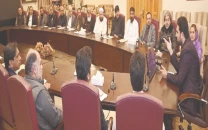Why we fight: Wars over resources is nothing new, speakers explain
Ashfaq Saleem Mirza delivers lecture on history and war.

Mirza said that even today, wars are being waged in different parts of the world to take over the resources required to sustain life.
It is difficult to deny the pervasiveness of war in human history. Intellectuals have often tried to pinpoint why exactly humans fight wars with such tremendous frequency. Control over resources, territorial domination, security, and identity have often been cited in academic research as major causes of war.
But Ashfaq Saleem Mirza, veteran writer and intellectual, thinks the factors boil down to three human needs.
“It is not that war is some alien that landed from space,” Ashfaq Saleem Mirza said. “War has been employed to fulfill necessities such as food, shelter and sex, and this is even true today.”
Mirza was reading his essay on “History and War” at a meeting of the Islamabad Cultural Forum at the Human Rights Commission of Pakistan on Wednesday. The meeting was part of a lecture series by the School of Modern History and Philosophy.
He said humans have tried to blame wars on ideology or moral values, but it is essentially the three basic necessities that lie at the heart of the concept of war.

Mirza said that even today, wars are being waged in different parts of the world to take over the resources required to sustain life.
He claimed that because of its motivations, war not only strongly affects history, but also aids and abets history’s forward momentum.
“The study of history tells us that war has an indispensable importance in the events that have occurred thus far,” Mirza said at the start of his talk.
Mirza talked about war as depicted in the Mahabharata and Homer’s Iliad, quoting passages that showed Krishna pushing Arjuna to prepare for battle and characters from the Trojan War dismissing peace talks. He relied on academic texts to illustrate that the conquests of Alexander and the Napoleonic wars led to social, political, intellectual and administrative changes.
During the discussion, some participants suggested the need to oppose wars unequivocally, others were vocal about the changing face of war, and yet others blamed human greed for the bitter reality that is war.
“Perhaps we should also talk about war in the modern context so we can educate ourselves about ongoing conflicts,” Kishwar Naheed said.
Published in The Express Tribune, February 21st, 2013.


















COMMENTS
Comments are moderated and generally will be posted if they are on-topic and not abusive.
For more information, please see our Comments FAQ